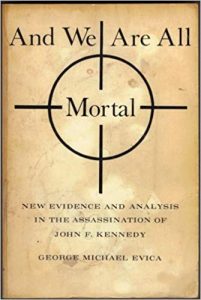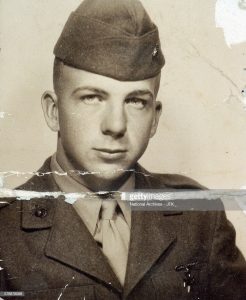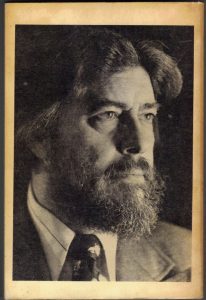Introduction to A Certain Arrogance, by George Michael Evica
To Withdraw From the Tumult of Cemeteries
By Charles R. Drago
… human kind
Cannot bear very much reality
— T. S. Eliot, “Burnt Norton,” Four Quartets
Let me be clear from the outset: A Certain Arrogance is no more or less “about” the assassination of John F. Kennedy than cancer surgery is “about” the tumor.
George Michael Evica, one of the preeminent prosectors of the malignant growth that disfigured the American body politic on November 22, 1963, for decades focused his intellect and intuition on the search for a cure for the underlying disease. In the course of forty years of research, analysis, writing, broadcasting, and teaching, he followed its devastating metastasis through the vital organs of politics (deep and otherwise) to the extremities of business, culture, and religion. All the while he cut away necrotic tissue and struggled valiantly, in the company of a surgical team as distinguished as it is obscure, to keep the patient alive.
Professor Evica, author of And We Are All Mortal: New Evidence and Analysis in the Assassination of John F. Kennedy (1975; University of Hartford), must be numbered among the most honored of the so-called second generation of Kennedy assassination researchers. Their labors to refine, reinforce, expand upon, and draw attention to the discoveries of their predecessors validate this direct statement of fact:
Anyone with reasonable access to the evidence in the homicide of JFK who does not conclude that the act was the consequence of a criminal conspiracy is cognitively impaired and/or complicit in the crime.
A Certain Arrogance stands as Professor Evica’s response to the unavoidable question: How do we define and effect justice in the wake of the world-historic tragedy in Dallas?
Clearly he understood that, at this late date, being content merely to identify and, if possible, prosecute the conspiracy’s sponsors, facilitators, and mechanics would amount to hollow acts of vengeance. Cleaning and closing the wound while leaving the disease to spread is simply not a survivable option.
With the nobility of knowledge comes obligation: How can we utilize all that has been learned through our post-Dallas investigations to heal and immunize the long-suffering victims of the malady of which the assassination of John F. Kennedy is but the most widely appreciated and putrescent manifestation?
The method by which Professor Evica honored his noblesse oblige is, at first blush, hardly novel. Like many other researchers, he chose to begin his exploration by focusing on an aspect of the complex life of the lead character in the assassination drama, Lee Harvey Oswald. To carry the cancer metaphor forward: Think of the falsely accused killer as a tumor cell whose sojourn through the host organism in theory can be traced back to its source.
Oswald’s movements, however, are not easily discerned. False trails and feints abound. Promising clues have been obscured by a host of ham-handed interlopers and sinister obfuscators.
Rather than traverse well-worn pathways, Professor Evica set out by following one of the few remaining under-examined passages of an otherwise over-mapped life. His uniquely painstaking investigation of Oswald’s involvement with Albert Schweitzer College (hereinafter ASC), including the processes and implications of his application, acceptance, and nonattendance, has led both to major discoveries and to significant refinements of previously developed hypotheses.
In the former category our attention is drawn to what Professor Evica termed “one of U.S. intelligence’s last important secrets,” the involvement by the Central Intelligence Agency and psychological operations (psyops) in student and youth organizations – especially those with religious affiliations.
The U.S. government’s faith-based initiatives, it seems, did not originate with George W. Bush’s alleged presidency.
As he meticulously followed Oswald’s ASC paper trail, the author was led not toward the Swiss campus, but rather into brick walls and empty rooms. A prime example: Oswald applied to the college on March 19, 1959. Less than two months later, when the chairman of ASC’s American Admissions Committee (and, at the time, the pastor of the First Unitarian Church of Providence, Rhode Island) submitted to Switzerland the applications and related materials of prospective American students, Oswald’s folder was included.
Today those documents – critically important evidence in the investigation of the crime of the 20th century – do not exist in any official repository. Yet copies, or perhaps even originals, were in the Providence ASC file seized by the FBI after the assassination. This troubling absence, within a broader context fully substantiated in A Certain Arrogance, inevitably lead the author to conclude that Oswald’s application to ASC is “a still-protected American intelligence operation.”
I do not wish to spoil the bittersweet joy of discovery to be experienced as readers accompany Professor Evica on his journey through terra incognita. Yet the methodology and ultimate value of A Certain Arrogance as a “whodunit” (as opposed to the “howdunit” nature of the overwhelming majority of JFK assassination-related volumes) must be fully appreciated. To discover the identities of Oswald’s early manipulators is to be drawn into the necrotic nucleus of the disease. And so, thanks to the Evica investigation of the ASC charade, we are left with a preliminary, shattering conclusion regarding the “who” we seek.
“Whoever directed the Oswald [assassination] Game was thoroughly knowledgeable about both the OSS’s and CIA’s counterintelligence manipulations of Quakers, Unitarians, Lutherans, Dutch Reformed clerics and World Council of Churches officials as intelligence and espionage contacts, assets, and informants.”
From the mountains and snowfields and quaint villages of Switzerland, Professor Evica chose to escort us through a darker, more mysterious inner landscape. Examinations of what he neatly summarized as “U.S. covert intelligence operating under humanitarian cover” leads us to a confrontation with psychological operations – psyops and its propaganda, disinformation, and morale operations alter egos.
Professor Evica was the first to understand the Kennedy assassination and other intelligence operations as by-design theatrical productions, replete with all the essential elements of drama – including shameless manipulations of audiences’ minds and emotions. Within these pages he further supported and refines this hypothesis.
“Psychological manipulations of individuals and groups, whatever the procedure may have been called in the 18th and 19th centuries, drew upon discoveries in anatomy, mesmerism, hypnotism, counseling, studies in hysteria, rhetorical theory, psychoanalysis, advertising, behavior modification, and psychiatry. In the same periods, the literary forms of irony, satire, and comedy and the less reputable verbal arts of slander, libel, and manufactured lies were applied.”
Before we are tempted to argue that the realities of war often require an honorable combatant to mimic, for a limited period and with noble intent, the darker designs of an evil foe, note that Professor Evica reminded us that, “Most of these genres and strategies were enlisted in the service of social, class, and political power.” He then identified the likely director of the propaganda component of the aforementioned Oswald Game.
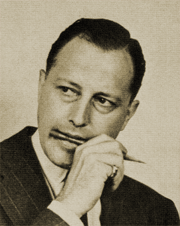 C. D. Jackson was “the psyops expert who organized and ran General Dwight David Eisenhower’s Psychological Warfare Division at SHAEF … an official of the Office of War Information … [and] a veteran of the North African campaign.”
C. D. Jackson was “the psyops expert who organized and ran General Dwight David Eisenhower’s Psychological Warfare Division at SHAEF … an official of the Office of War Information … [and] a veteran of the North African campaign.”
Jackson’s career and its impact upon American history, heretofore marginally understood at best (he is widely identified as the Time-Life editor who purchased the Zapruder film) are major focuses of A Certain Arrogance. Nowhere is both the validity of Albert Einstein’s observation that “the distinction between past, present and future is only a stubbornly persistent illusion” and the contemporary relevance of Professor Evica’s discoveries more clearly evident than in the author’s exposition of the Jackson oeuvre. In particular we are drawn to the discussion of how mass media early on was identified as a key weapon in the mind control arsenal. In a 1946 letter to Jackson, General Robert McClure, at one time Eisenhower’s chief of intelligence for the European theater, boasted to his psyops counterpart of the scope of their manipulation.
“We now control 137 newspapers, 6 radio stations, 314 theaters, 642 movies, 101 magazines, 237 book publishers, 7,384 book dealers and printers, and conduct about 15 public opinion surveys a month, as well as publish one newspaper with 1,500,000 circulation … run the AP of Germany, and operate 20 library centers.”
Fairness and balance, it seems, did not originate with the Fox Network’s alleged news division.
Haunting the pages of A Certain Arrogance in the company of the shades of John Fitzgerald Kennedy and Lee Harvey Oswald is a revelation so menacing in its assault on convention as to provoke a reflexive shielding of our eyes from its searing light. Yet the author could not spare us the psychic pain that is the unavoidable side effect of his scholarship, insofar as such suffering remains the sine qua non for the eradication of our common malady and the return to robust good health.
Within the nucleus of the disease, Professor Evica discovered “a treasonous cabal of hard-line American and Soviet intelligence agents whose masters were above Cold War differences.”
In light of this revelation, we are left with no choice but to embrace a new paradigm of world power.
Professor Evica revealed the universally accepted vertical, East v. West Cold War confrontation to have been a sophistic construct, illusory in terms of its advertised raison d’etre, all too real in its bloody consequences, created by the powerful yet outnumbered manipulators of perception to protect what they recognized to be an all too fragile reality. The true division of power, he taught us, then as now is drawn on a horizontal axis.
Envision the earth so bifurcated, with the line drawn not at the equator, but rather at the Arctic Circle. Above the line are the powerful few – the “Haves.” Below the line, in vastly superior numbers, are the powerless many – the “Have-Nots.”
Can we bear so much reality?
While contemplating the implications of Professor Evica’s research, I was reminded of how Francis Ford Coppola struggled to find the best thematic hook on which to hang the plot of The Godfather, Part III. It is said that he considered and ultimately rejected a treatment of the Kennedy assassination as the most cinematically viable expression of systemic evil in full flower. Instead – perhaps wisely, perhaps not – he opted to dramatize the Vatican Bank scandal.
Upon initial examination, the conjoined stories of the looting of the Banco Ambrosiano, the perfidy of Roberto Calvi and P2, the assassination of John Paul I, and the corruption of the Roman Catholic Church at its highest levels present as the cellular components of yet another tumor, arguably the most horrific manifestation imaginable of the disease being probed by Professor Evica.
We are incredulous. We are outraged.
Then reason returns.
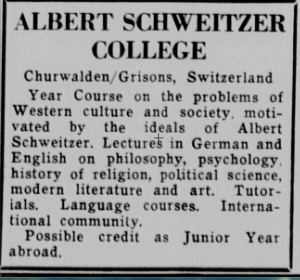 The manipulations of religious institutions for unholy purposes by elements of the deep political structure should provoke neither surprise nor anger. For is not organized religion merely politics by other means? Are not the most powerful bishops – of the wandering and Maurice varieties, among others – devoted to the same dark liturgy?
The manipulations of religious institutions for unholy purposes by elements of the deep political structure should provoke neither surprise nor anger. For is not organized religion merely politics by other means? Are not the most powerful bishops – of the wandering and Maurice varieties, among others – devoted to the same dark liturgy?
The assault on Albert Schweitzer, however, is another matter.
“The ethical spirit … must be awakened anew,” Dr. Schweitzer instructed at the height of the Cold War. The defiling of the name and the perversion of the mission of that saintly man no doubt provoked sweet satisfaction within the breasts of those for whom a worldview informed by ethics is simply not a survivable option.
What then of justice? Have we any reason to expect the guilty to be punished, the disease to be eradicated? The novelist Jim Harrison:
“People finally don’t have much affection for questions, especially one so leprous as the apparent lack of a fair system of rewards and punishments on earth … We would like to think that the whole starry universe would curdle … the conjunctions of Orion twisted askew, the arms of the Southern Cross drooping. Of course not; immutable is immutable and everyone in his own private manner dashes his brains against the long suffering question that is so luminously obvious. Even gods aren’t exempt; note Jesus’ howl of despair as he stepped rather tentatively into eternity.”
It is for us to deliver justice and heal ourselves, to muster the courage to ask questions and the strength to endure answers.
Within the pages of A Certain Arrogance, George Michael Evica continues to lead us by example.
***
Autumn Too Long: A Remembrance
November is a cruel month, and one that figures all too prominently in the life and times of George Michael Evica.
It was on a brilliant, unnaturally warm November morning in 2007 that loved ones laid to rest my friend and mentor, my confidante and comrade-in-arms, my spiritual guide and now my spirit guide.
As I carried the incongruously small urn that contained his physical remains, my thoughts drifted to another November day, when George Michael and I had found ourselves in Dealey Plaza at dusk, far from the madding crowd. Light was filtered thinly through brittle leaves and sorrow. And I asked if he too sensed the presence of unquiet spirits.
As usual, George Michael was years ahead of me. He said that he had experienced the same feelings on many occasions in that place. He spoke at length, his voice subdued yet redolent with conviction, about his certainty that the fight against the forces that struck John Fitzgerald Kennedy, the same forces that today prowl the killing fields of the Middle East and Africa and Asia and the Americas, endures into the next world.
The calm of Saint John’s churchyard where he rests represents but a temporary respite.
Again I am drawn to the words of James Lee Burke, who showed us that he understands this immutable truth when he wrote the following ruminative passage for his fictional Cajun detective Dave Robicheaux:
“Down the canyon, smoke from meat fires drifted through the cedar and mesquite trees, and if I squinted my eyes in the sun’s setting, I could almost pretend that Spanish soldiers in silver chest armor and bladed helmets or a long-dead race of hunters were encamped on those hillsides. Or maybe even old compatriots in butternut brown wending their way in and out of history … gallant, Arthurian, their canister-ripped colors unfurled in the roiling smoke, the fatal light in their faces a reminder that the contest is never quite over, the field never quite ours.”
_____________________________________________________________________
George Michael Evica was born in Cleveland, Ohio, on 8th December, 1927. He studied at the Case Western Reserve University (1945-49) and Columbia University (1951-55).
He taught at the Rutgers University (1956-57), Columbia University (1957), Wagner College (1957-59), Brooklyn College (1957-1960), San Francisco State (1960-1964) and the University of Hartford (1964-1992).
Subjects taught included Myth and Ritual in Literature, Genre Studies in Literature, Literary Criticism, Consciousness Development and the Symbolic Process, Linguistics, Film Studies, Creative Writing, Investigative Reporting, and Investigative History. He also published papers on John F. Kennedy, Fidel Castro, and Jimmy Hoffa He also studied Advanced Studies in Linguistics and Anthropology at Columbia University (1957-1960) and Advanced Studies in Myth and Literature at Hartford Seminary Foundation (1971-73).
In 1977 George Michael Evica provided evidence to the House Select Committee on Assassinations. He also wrote extensively about the assassination of John F. Kennedy. This included, And We Are All Mortal: New Evidence And Analysis in the Assassination Of John F. Kennedy (1978). It was described by Mary Ferrell as the “best documented” of the books on the assassination.
Evica organized and hosted the first national conference on the JFK Assassination in October, 1975, at the University of Hartford. Attendance exceeded 2,500. Jim Garrison participated and praised Evica for his groundbreaking work.
Evica was director of the Connecticut Citizens Commission of Inquiry (1975-76). He published twelve major articles and presented twenty-two major papers at conferences on the assassination in the United States and Europe.
Evica also produced a weekly half-hour radio program which initially focused on the JFK assassination and related matters, and later covered a wide range of political topics from a so-called “radical” perspective. “Assassination Journal,” which was modeled on I.F. Stone’s weekly news publication, was broadcast by the University of Hartford’s radio station WWUH from 1975 to 2007; he continually expanded its investigative scope to include coups, murders, and mysteries such as TWA 800, the Gulf War Syndrome, and the failed war on drugs.
In 1992 he delivered a major paper at the JFK assassination conference in Chicago, and a year later co-hosted, with Charles Drago, the Providence JFK conference of “The Third Decade.” He ran seven Dallas conferences (1994-2000) for JFK Lancer.
Evica received the Mary Ferrell Lifetime Achievement Award in November, 1997. His final book, A Certain Arrogance, was published in 2006.
He was a lifetime fellow, elected by the Board of Directors, of the Society for the Advancement of the Arts, Religion, and Contemporary Culture.
George Michael Evica died on November 10, 2007 of chronic pulmonary obstruction brought on by eight cases of pneumonia suffered before and during his treatment for lung cancer that had metastasized into brain cancer, and which was cured. At the time of his death he was working on three projects: “The Iron Sights”, a series of studies on the JFK assassination (including an expanded version of “The 81 Promises,” which will be completed posthumously by Charles Drago); “The Horned Hind”, on the ancient origins of cuckoldry; and “The Blood Mysteries of Brian De Palma”, on recurring patterns of ritual and myth in De Palma’s films.
___________________________________________________________________
DRAGO’S THOUGHTS ON EVICA’S LEGACY
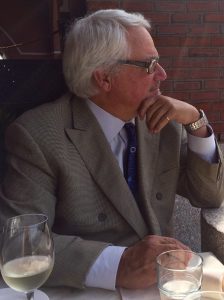 Among a significant majority of serious (self-styled and otherwise) JFK assassination researchers, the Kennedy-related literary oeuvre of George Michael Evica remains neglected, minimally understood, and in some instances unknown. The abandonment of this accumulated institutional knowledge has resulted in inferior duplications of effort that contribute mightily to the delay and to date denial of justice for the murdered president and the countless millions who make up the collateral damage of the Dealey Plaza attack.
Among a significant majority of serious (self-styled and otherwise) JFK assassination researchers, the Kennedy-related literary oeuvre of George Michael Evica remains neglected, minimally understood, and in some instances unknown. The abandonment of this accumulated institutional knowledge has resulted in inferior duplications of effort that contribute mightily to the delay and to date denial of justice for the murdered president and the countless millions who make up the collateral damage of the Dealey Plaza attack.
A rhetorical question – at least for me: How can we account for this absurd state of affairs in light of Evica’s monumental, ground-breaking contributions to our work? Evica’s book length And We Are All Mortal: New Evidence And Analysis in the Assassination Of John F. Kennedy, published in 1978, was described by Mary Ferrell as the “best documented” study of the assassination. Ferrell also frequently and publicly opined that “George Michael will be the one to solve this case.” In 2006, his A Certain Arrogance delivered truly revolutionary research into the manipulation of Cold War liberal religious and educational institutions by American intelligence agencies in furtherance of their masters’ criminal global agendas.
In terms of Evica’s multi-disciplinary scholarship, humanities-driven insights, and sheer eloquence, only Peter Dale Scott stands as a true peer.
Further, in October, 1975, Evica organized and hosted the first national conference on the JFK Assassination at the University of Hartford. Attendance exceeded 2,500. Jim Garrison participated and praised Evica for his groundbreaking work.
And yet …
For now I’ll refrain from providing answers to the rhetorical question posed above. But the poseurs and profiteers — not to mention the agents provocateur – who pollute the JFK assassination research community and who would minimize the value of Evica’s life-long labors know who they are and why they act as they do.
ORDER A CERTAIN ARROGANCE FROM AMAZON
[Editor’s note: George Michael Evica served on the Board of Directors of the AARC.]


